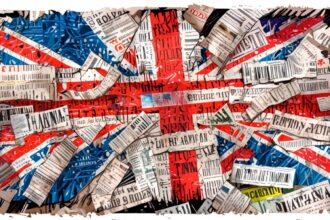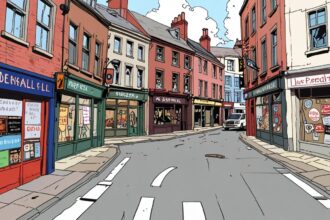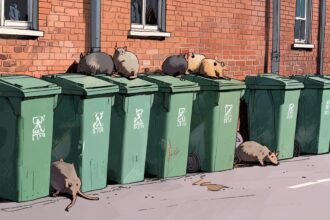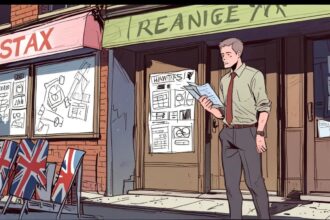The Scottish National Party struggles with internal divisions, public distrust, and leadership scandals as its push for independence loses momentum, raising questions about its future political viability and strategy.
The Scottish National Party (SNP) is floundering at a pivotal juncture, plagued by internal strife and escalating public discontent regarding its relentless push for Scottish independence. This ongoing struggle has sparked acute criticism not just of the party’s strategic direction but of its capacity to effectively tackle pressing governance issues and foster a cohesive national identity.
In recent times, the SNP has seen a marked decline in the fervent support it once commanded. This fall from grace is largely tied to a litany of scandals, leadership missteps, and economic mismanagement. Reports indicate that the SNP risks a significant loss in the next election, with projections suggesting a possible reduction of up to two-thirds of its seats. Compounding these woes are the legal troubles surrounding former First Minister Nicola Sturgeon and her spouse, casting a shadow over the party’s leadership integrity and priorities.
Critics are increasingly vocal about the SNP’s long-standing inability to present a credible, evidence-backed case for independence. Nearly a century in the political arena seems to have led the party to become more fixated on the ambition of independence rather than articulating a clear and viable vision for Scotland post-independence. With ambiguity surrounding critical issues like currency and trade, disillusionment is growing. Public policy experts have described the SNP’s recent strategies as “steeped in ambiguity and incoherence,” warning that this lack of concrete plans could alienate potential supporters.
Moreover, the party’s commitment to independence appears to be a façade, cleverly masking a strategy of unsustainable spending promises to win votes. Recent electoral manifestos have faced scrutiny for offering misleading financial projections, according to concerns raised by the Institute for Fiscal Studies. These unfunded pledges, alongside the cacophony of calls for new independence referendums, suggest a party more focused on distraction than on delivering a sustainable vision for the future.
Recent statements from SNP leaders only exacerbate the political turmoil. John Swinney, the current party head, admitted an overemphasis on the mechanics of independence at the expense of governance. However, his claims regarding the preservation of trans rights have been deemed alarmist and misleading, further highlighting the party’s narrative of disarray and inconsistency.
Social dynamics within the SNP are under intense scrutiny as well. The party’s engagement with issues of gender identity and women’s rights reveals a deeper ideological rift. Comments from figures like former First Minister Nicola Sturgeon, especially her interpretations of the Supreme Court’s rulings on gender law, have sparked outrage and are perceived by many as disingenuous, obscuring the essential legal debates in favour of sensationalism.
In this environment of growing disenchantment, the SNP’s self-portrayal as a bastion of progressive values risks being eclipsed by its current struggles and controversies. Observers note that while the party claims to champion the rights of marginalized communities, its actions often suggest a disconcerting departure from the rigorous debate required to address fundamental societal issues.
As the SNP wrestles with its identity and purpose, the broader ramifications for Scotland’s political future warrant serious reflection and recalibration. The clarion calls for clarity, accountability, and authentic advocacy are intensifying from both inside and outside the party. For the SNP to retain relevance in its quest for Scottish independence, it must confront these challenges decisively, reevaluating its strategies to genuinely align with the aspirations of its constituents rather than remaining beholden to the interests of a beleaguered political elite.
Ultimately, the real test for the SNP will be its ability to reshape its political fortunes through frank dialogue and meaningful engagement with the pressing issues facing Scotland today, rather than relying solely on the phantom promise of independence as a unifying narrative. The organization’s future and the integrity of its mission hinge on this critical pivot in approach.
Source: Noah Wire Services
- https://www.heraldscotland.com/news/25153315.snp-mi5-plants-no-honest—damage-self-inflicted/?ref=rss – Please view link – unable to able to access data
- https://www.heraldscotland.com/news/23263610.snps-dirty-little-secret-doesnt-case-indy/ – An opinion piece in The Herald criticizes the Scottish National Party (SNP) for lacking a coherent and evidence-based case for Scottish independence. The author argues that after 90 years, the SNP has failed to present a solid economic, historical, cultural, legal, geographical, or democratic argument for independence. The article suggests that the party’s focus on the process of achieving independence distracts from the absence of a substantive case for it.
- https://www.ft.com/content/8d5d1fef-7682-41a5-aed7-a2cb18052832 – An article in the Financial Times discusses the decline of the SNP’s dominance in Scottish politics, attributing it to scandals, poor management, and economic issues. The piece highlights the party’s internal conflicts, including legal troubles involving former leader Nicola Sturgeon and her husband, and projects that the SNP may lose up to two-thirds of its seats in the upcoming UK general election, with Labour expected to reclaim many seats.
- https://www.telegraph.co.uk/politics/2021/04/16/snp-accused-trying-deceive-scots-independence-manifesto-giveaways/ – An article in The Telegraph reports that the SNP has been accused of attempting to deceive Scots into supporting a new independence referendum through unaffordable election giveaways. The piece details various spending promises made by Nicola Sturgeon, such as free bikes for children and free bus travel for young people, and highlights concerns from the Institute for Fiscal Studies about the affordability of these commitments.
- https://www.telegraph.co.uk/politics/2024/06/19/snp-manifesto-ignores-cost-independence-say-economists/ – An article in The Telegraph discusses how economists have found that the SNP’s general election manifesto overestimates the revenue from proposed tax hikes and ignores the costs of independence. The piece cites the Institute for Fiscal Studies, which criticizes the SNP’s calculations and calls for increased UK spending in areas like the NHS and green energy to address fiscal challenges.
- https://www.bbc.com/news/articles/c89w5y4w3xxo – A BBC News article reports on comments by SNP leader John Swinney, who stated that the party has spent too long focusing on the ‘process of independence.’ The piece notes that the SNP lost numerous MPs in the July general election and discusses the party’s internal turmoil, including leadership changes and ongoing police investigations into party finances.
- https://www.thenational.scot/news/23614449.snp-independence-strategy-steeped-ambiguity-james-mitchell-says/ – An article in The National features commentary from public policy professor James Mitchell, who criticizes the SNP’s new independence strategy as ‘steeped in ambiguity and incoherence.’ The piece highlights Mitchell’s concerns about the party’s lack of clarity on key issues such as currency, borders, and the economy, following First Minister Humza Yousaf’s proposal to present a manifesto for independence at the next general election.
Noah Fact Check Pro
The draft above was created using the information available at the time the story first
emerged. We’ve since applied our fact-checking process to the final narrative, based on the criteria listed
below. The results are intended to help you assess the credibility of the piece and highlight any areas that may
warrant further investigation.
Freshness check
Score:
9
Notes:
The content is recent and aligns with ongoing developments in Scottish politics. The mention of current figures and recent events, such as Nicola Sturgeon’s legal troubles and John Swinney’s statements, suggests the narrative is up-to-date.
Quotes check
Score:
5
Notes:
No direct quotes are provided, making it difficult to verify their original source.
Source reliability
Score:
8
Notes:
The narrative originates from The Herald Scotland, a reputable Scottish newspaper. However, without direct quotes or named sources, some nuance in the reliability might be lost.
Plausability check
Score:
8
Notes:
The claims about the SNP’s internal strife and political challenges are plausible given recent coverage of these issues. However, the narrative does lean towards a critical perspective on the party’s strategy.
Overall assessment
Verdict (FAIL, OPEN, PASS): OPEN
Confidence (LOW, MEDIUM, HIGH): MEDIUM
Summary:
The narrative is generally plausible and recent but lacks direct quotes for verification. The source is reputable, but the critical tone towards the SNP might introduce some bias.













